模块6 Unit 2 What is happiness to you? 课件1
文档属性
| 名称 | 模块6 Unit 2 What is happiness to you? 课件1 |  | |
| 格式 | rar | ||
| 文件大小 | 764.5KB | ||
| 资源类型 | 教案 | ||
| 版本资源 | 牛津译林版 | ||
| 科目 | 英语 | ||
| 更新时间 | 2009-10-18 14:18:00 | ||
图片预览

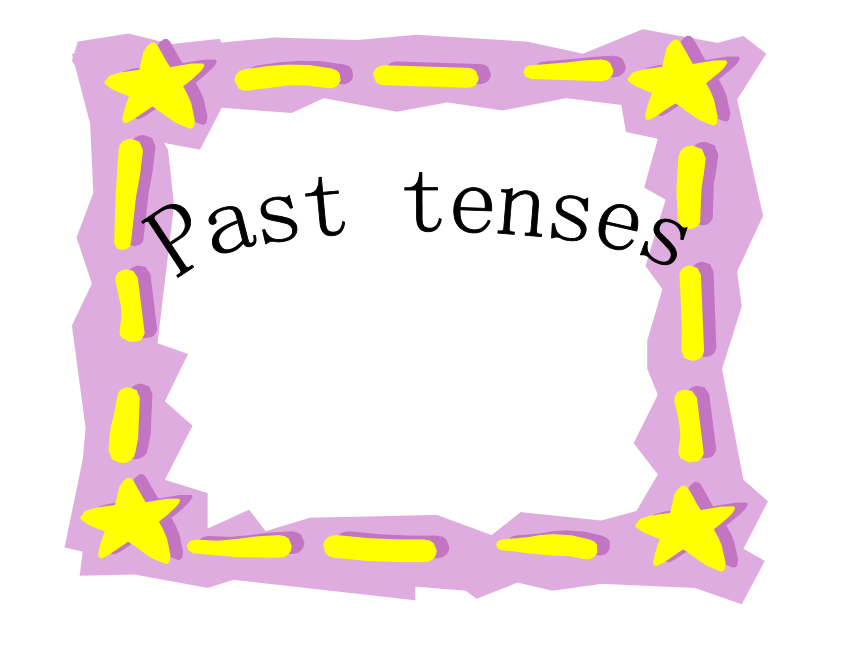
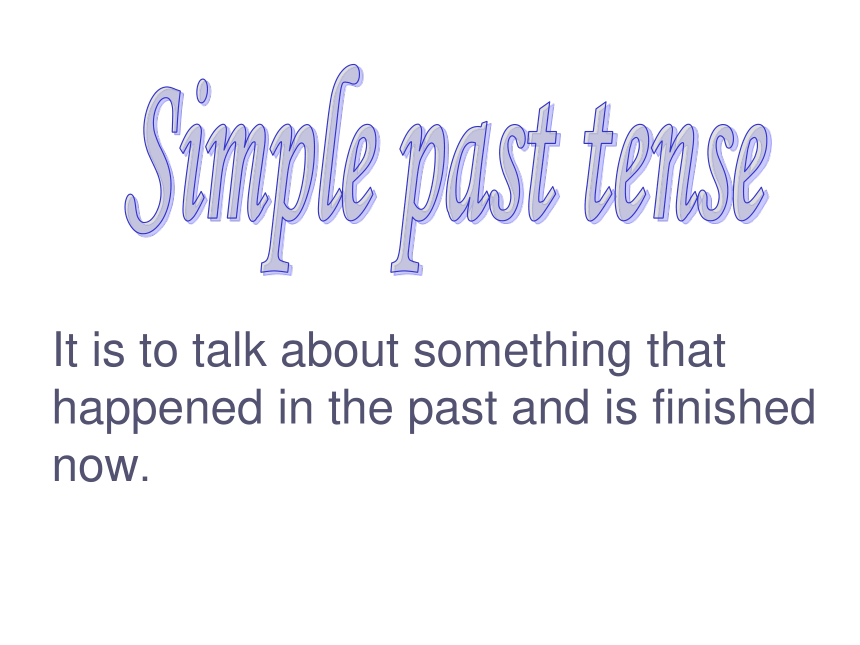
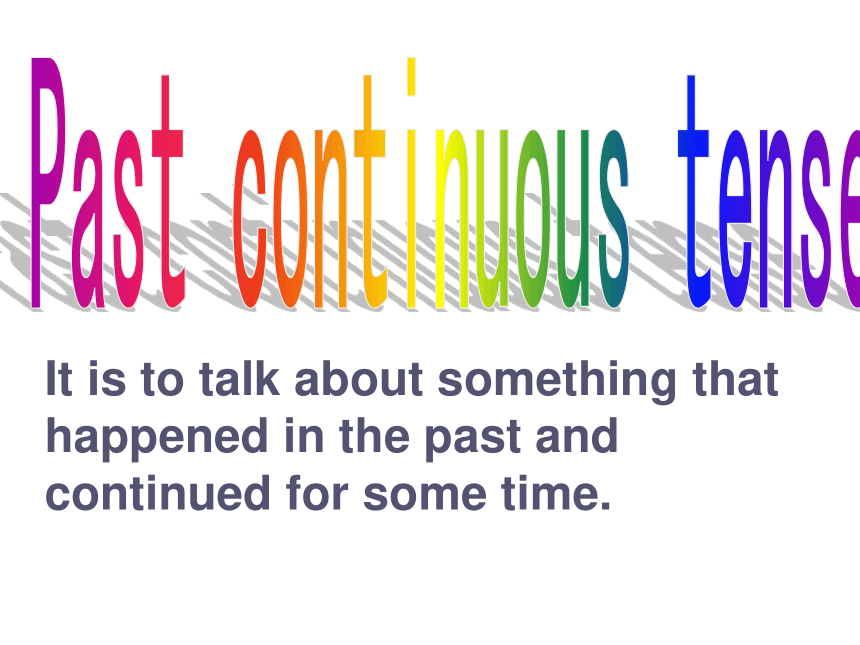

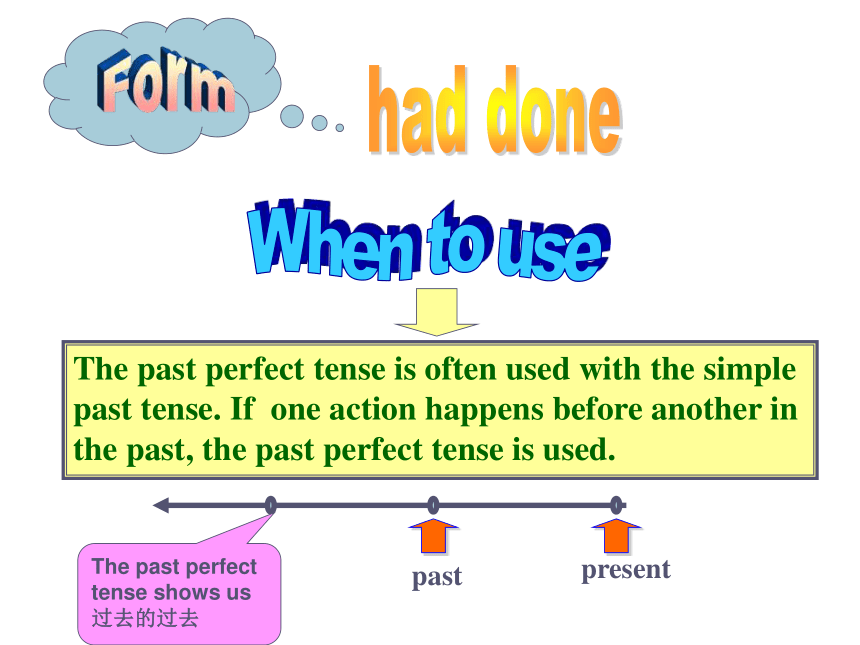
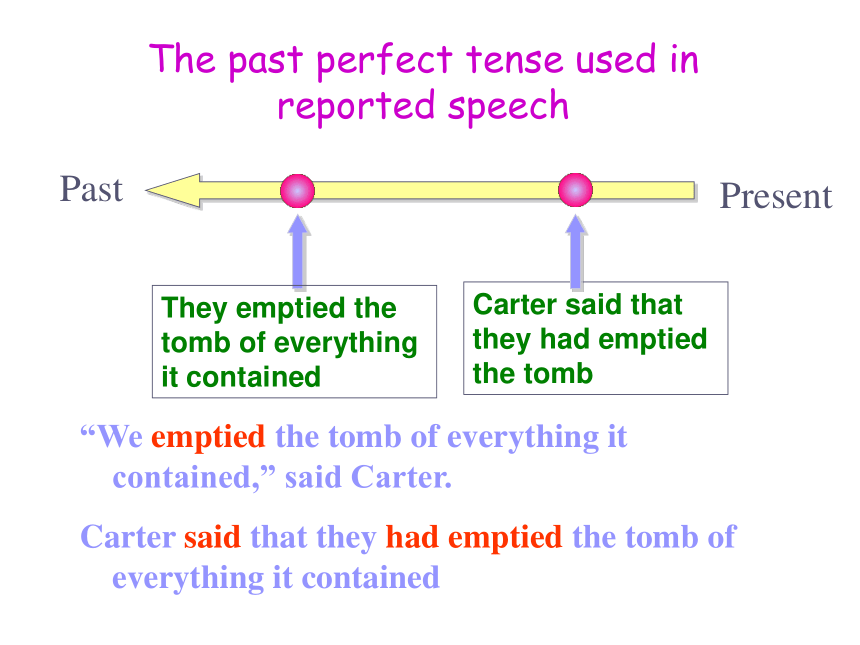
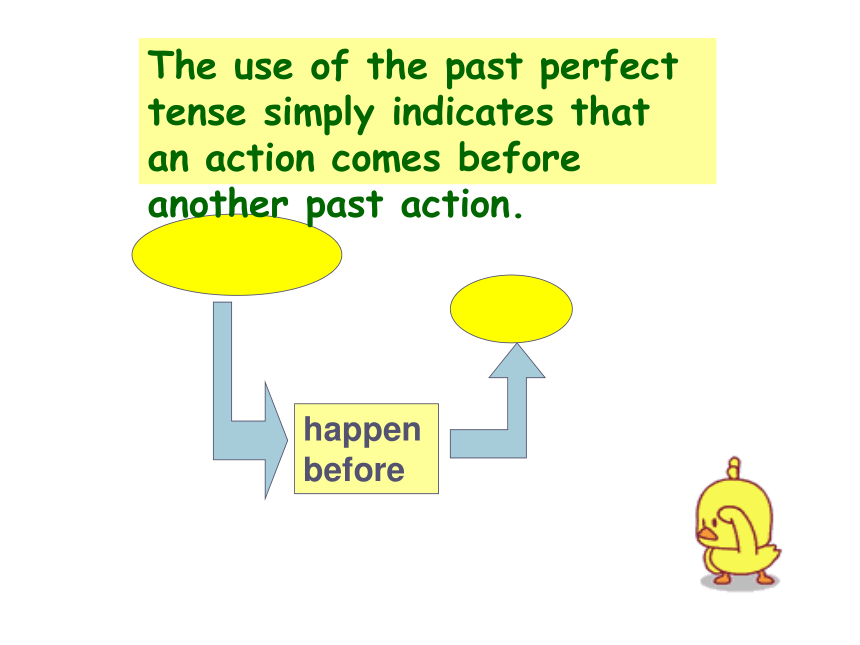
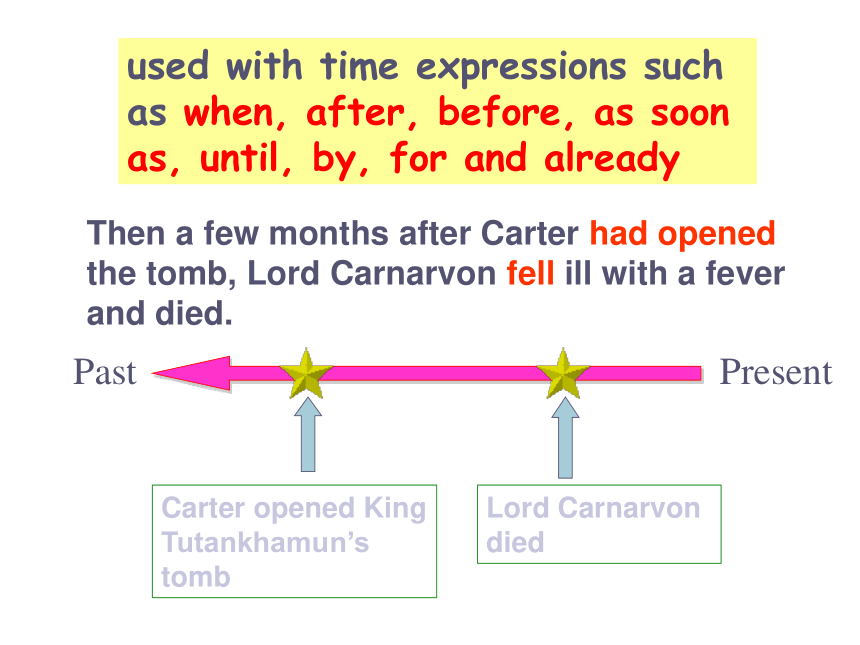
文档简介
课件27张PPT。Grammar & UsagePast tenses Simple past tenseIt is to talk about something that happened in the past and is finished now. Past continuous tenseIt is to talk about something that happened in the past and continued for some time.Past perfect tenseFormhad doneWhen to useThe past perfect tense is often used with the simple past tense. If one action happens before another in the past, the past perfect tense is used.presentpastThe past perfect tense shows us 过去的过去The past perfect tense used in reported speech PresentPast“We emptied the tomb of everything it contained,” said Carter.
Carter said that they had emptied the tomb of everything it containedThey emptied the tomb of everything it containedCarter said that they had emptied the tombThe use of the past perfect tense simply indicates that an action comes before another past action.happen beforeused with time expressions such as when, after, before, as soon as, until, by, for and alreadyCarter opened King Tutankhamun’s tombThen a few months after Carter had opened the tomb, Lord Carnarvon fell ill with a fever and died.Lord Carnarvon diedPastPresentwill / shall dobe going to dobe about to dodo / doesbe doingbe to doHOWto express
the simple future tenseI. The simple future The Usage of the Simple Future TenseChina will be holding the Olympic Games in 2008You will be attending the college Entrance Examination from July 7 to 10 in 2008Guess what the tense is!II.Future continuous tenseI ________ (have) an English class tomorrow morning.
I ____________ (have) an English class at 8:20 tomorrow morning Think about it!will be havingwill have Talk about something that will be in progress at a certain time or over a period of time in the future.
(讨论将来某个时间点或时间段正在进行的动作)
Future Continuous Tense (1)Toby will not be in London next Tuesday. He will be climbing in the Himalayas.
Toby will be climbing in the Himalayas all next week.
Express future without intention. When it is used in this way, we want to indicate that something will happen naturally. It doesn’t imply that the speaker has arranged the action.
(表示不包含说话者主观意愿的纯粹将来。使用这种方式,我们想表达某件事
会很自然地发生,说话者并不参与
安排或计划。)Future Continuous Tense (2)Tom won’t cut the grass.
Tom refuses to cut the grass.
Tom won’t be cutting the grass.
The sentence is only a statement of
fact, giving no information about Tom’s
intention. Perhaps Tom is away, or ill, or
will be doing some other job.Let's compare!Summary The simple future tense expresses a future action with intention while the future continuous tense expresses a future action as a statement of fact. Make polite enquiries about other people’s future plans.
(委婉地询问对方的未来计划,比用will do听起来更有礼貌。)Future Continuous Tense (3)
What will you be doing tomorrow?
Will you be working all day?
Will you be using your dictionary?
When will you be shopping at the supermarket?More examples1) A: Will you be using your bicycle this evening?
B: No. So you want to borrow it?
A: Yes. When can I get it?
B: After I go to heaven.
Enjoy the jokes2) A: Will you be passing the post office when
you’re out?
B: Probably. Why?
A: I need some stamps. Could you get me
some?
B: Sure. Money, please.
A: How much do you
want?
B: The more, the better.Enjoy the jokesIII. The future in the past
The usage of the future in the past is to talk about an event which was in the future at the time when it was discussed.
eg. Before she came here, she said that she was going to beat all the others in the game. practice用所给动词的适当的过去时或将来时的形式填充。
1. Let's keep to the point or we ______ never_______(reach) any decisions.
2. I don’t think Jim saw me; he _____ just ______ (start) into space.
3. --George and Lucy got married last week. Did you go to their wedding?
--No, I ______ ______ ______(invite). Did they have a big wedding?
4. His wife _____ ______(hope) to catch the first train but she was too late.
5. I _____ ______(catch)in the heavy rain on the way to the cinema. willreachwasstartinghadn’tbeeninvitedhopedwascaught6.What_____you ______ _______(do)at this time tomorrow?
7. What he had said at the meeting _____(prove) true.
8.---Did you see Tom at the party?
---No. He _____ _____(leave) by the time I arrived. willbedoingprovedhadleftThank you!
Carter said that they had emptied the tomb of everything it containedThey emptied the tomb of everything it containedCarter said that they had emptied the tombThe use of the past perfect tense simply indicates that an action comes before another past action.happen beforeused with time expressions such as when, after, before, as soon as, until, by, for and alreadyCarter opened King Tutankhamun’s tombThen a few months after Carter had opened the tomb, Lord Carnarvon fell ill with a fever and died.Lord Carnarvon diedPastPresentwill / shall dobe going to dobe about to dodo / doesbe doingbe to doHOWto express
the simple future tenseI. The simple future The Usage of the Simple Future TenseChina will be holding the Olympic Games in 2008You will be attending the college Entrance Examination from July 7 to 10 in 2008Guess what the tense is!II.Future continuous tenseI ________ (have) an English class tomorrow morning.
I ____________ (have) an English class at 8:20 tomorrow morning Think about it!will be havingwill have Talk about something that will be in progress at a certain time or over a period of time in the future.
(讨论将来某个时间点或时间段正在进行的动作)
Future Continuous Tense (1)Toby will not be in London next Tuesday. He will be climbing in the Himalayas.
Toby will be climbing in the Himalayas all next week.
Express future without intention. When it is used in this way, we want to indicate that something will happen naturally. It doesn’t imply that the speaker has arranged the action.
(表示不包含说话者主观意愿的纯粹将来。使用这种方式,我们想表达某件事
会很自然地发生,说话者并不参与
安排或计划。)Future Continuous Tense (2)Tom won’t cut the grass.
Tom refuses to cut the grass.
Tom won’t be cutting the grass.
The sentence is only a statement of
fact, giving no information about Tom’s
intention. Perhaps Tom is away, or ill, or
will be doing some other job.Let's compare!Summary The simple future tense expresses a future action with intention while the future continuous tense expresses a future action as a statement of fact. Make polite enquiries about other people’s future plans.
(委婉地询问对方的未来计划,比用will do听起来更有礼貌。)Future Continuous Tense (3)
What will you be doing tomorrow?
Will you be working all day?
Will you be using your dictionary?
When will you be shopping at the supermarket?More examples1) A: Will you be using your bicycle this evening?
B: No. So you want to borrow it?
A: Yes. When can I get it?
B: After I go to heaven.
Enjoy the jokes2) A: Will you be passing the post office when
you’re out?
B: Probably. Why?
A: I need some stamps. Could you get me
some?
B: Sure. Money, please.
A: How much do you
want?
B: The more, the better.Enjoy the jokesIII. The future in the past
The usage of the future in the past is to talk about an event which was in the future at the time when it was discussed.
eg. Before she came here, she said that she was going to beat all the others in the game. practice用所给动词的适当的过去时或将来时的形式填充。
1. Let's keep to the point or we ______ never_______(reach) any decisions.
2. I don’t think Jim saw me; he _____ just ______ (start) into space.
3. --George and Lucy got married last week. Did you go to their wedding?
--No, I ______ ______ ______(invite). Did they have a big wedding?
4. His wife _____ ______(hope) to catch the first train but she was too late.
5. I _____ ______(catch)in the heavy rain on the way to the cinema. willreachwasstartinghadn’tbeeninvitedhopedwascaught6.What_____you ______ _______(do)at this time tomorrow?
7. What he had said at the meeting _____(prove) true.
8.---Did you see Tom at the party?
---No. He _____ _____(leave) by the time I arrived. willbedoingprovedhadleftThank you!
